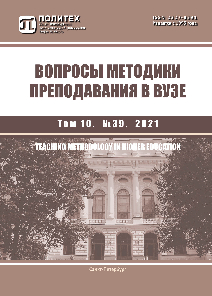Teaching foreign languages in a multi-level classroom
The paper summarises national and international experience in teaching foreign languages to a multi-level group of students. It reveals the causes and substantiates the inevitability of the emergence of heterogeneous groups. However, it is demonstrated that many problems caused by this heterogeneity are successfully solved with various techniques worked out by practicing teachers. Special attention in the paper is paid to the possibility and ways of solving these problems with university students studying languages in a multi-level group, though the methods that the authors have come across while doing their research were mostly designed in a secondary school setting. The paper considers different ways of evaluating students’ skills and needs, followed by planning a strategy of using a core textbook for the whole class or managing without it. Next, a general lesson plan is outlined, which caters for individual needs of every student and unites them in a single body with common goals and objectives. As the main technique of teaching a multi-level class is splitting students into groups during the lesson, great attention is devoted to various types of grouping and their efficient use in the process of studying, as well as ways of matching students for this purpose. Classroom arrangement is also recommended for different types of exercises and tasks at different stages of the lesson, as it can greatly affect communication. Proceeding to the problem of differentiating the tasks in all aspects of language teaching (reading, writing, listening and speaking) many examples of tasks for beginners, intermediate students and advanced learners working on the same topic or language material are given in detail. To reduce teacher’s work it is shown how some of their functions and responsibilities can be delegated to students. At the same time every effort is made to create a respectful and student-friendly environment, where all the learners feel that they are learning something new, their confidence is getting stronger and nobody suffers from being at a different level. The paper also focuses on the possibility of applying the principle of differentiating to the evaluation of students’ achievements throughout the year and at the end of the course. An idea is expressed that grading should take into account the students’ effort and personal growth rather than ability. At the same time it should objectively reflect the level of competence correlating with international systems of grading.



